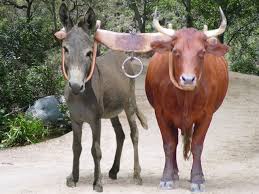To Fellowship Or Not Fellowship
A Nagging Question
To fellowship with a group of Sabbath-Feast-keepers or not has been a question plaguing me for the last couple weeks. A couple months ago we were invited to fellowship with this group.
Now, know that this is NOT a question whether to participate in a Sabbath convocation with this group of Sabbath-Feast-keepers. It seems quite clear to me that Torah and the teachings of the apostles demands that we convocate with one another: that we fellowship with other like-minded believers.
This particularly nagging question of fellowshipping or not is one of worshiping and studying the Word with individuals who strongly disagree with many of the essential tenets of the Hebrew Roots/Messianic Faith.
Inextricably Mired in Churchianity
The group in question seems inextricably mired in churchianity; denies the power and working of the Ruach HaKodesh (i.e., the Holy Spirit); rejects the wearing of tzitzits and the use of the Creator’s Name; and is without question in my mind misogynistic and anti-Jewish/anti-Hebrew.
Apart from these and other nagging differences, the people that compose this group appear to be lovely in their deportment. They, without a doubt, love one another and the Word of Yah.
Yet the question remains in my head: to fellowship or not?

Be Not Unequally Yoked
Be not unequally yoked with unbelievers: for what fellowship have righteousness and iniquity? Or what communion hath light with darkness?
A Question of Being Unequally Yoked
After praying for days and going back and forth in my mind on what to do about this thing, the Ruach spoke to me. I was reminded that as great as my desire to fellowship with others be, I cannot overlook the possibility that such an arrangement might actually be a mismatch that would not be pleasing to Father.
Paul’s instructions to the Corinthian Assembly of Messianic Believers came to mind. He wrote:
“Be not unequally yoked with unbelievers: for what fellowship have righteousness and iniquity? or what communion hath light with darkness” (2 Cor.6: 14; ASV)?
The New English Translation reads more modernly: “Do not become partners with unbelievers…” which is to say: do not become mismatched with others.
The New American Standard Bible reads: Do not become bound together with unbelievers.
Becoming Bound or Partnered With Non-Believers
So I did a study on this Pauline passage.
The highlighted phrase used by Paul in this verse in English is “unequally yoked.” In the Greek, the phrase is “Heterozugeo.”
The Friberg Greek Lexicon defines heterozugeo as follows:
“To be strictly yoked with an animal of a different kind; to be mismatched; to be wrongly associated together.”
A Question of Fellowship
The second-half of the verse Paul mentions fellowship. The Greek for fellowship is rendered as “Metoche.”
The Louw-Nida Greek Lexicon explains “Metoche” as:
“A relationship involving shared purposes and activity; a partnership; a sharing.”
So we have addressed in this verse by the Shaul the question of fellowshipping with individuals who do not believe or live as we do. And the obvious conclusion to be gained from a plain reading of this verse is that a Torah Observant Believer in Yeshua Messiah should not be in fellowship–in a partnership–with non-believers.
Paul Citing Torah Principle
The sentiment that Shaul paints with this well-known text has been accepted and taught doctrine by both mainstream Christianity and Hebrew Roots.
Yet I feel that this instruction, with the exception of a handful of hardcore congregations and Torah Observant Believers in Messiah, is rarely practiced. It seems that many of us are more than willing to fellowship–to partner–with individuals who in many cases outright reject our lifestyle and our belief system.
And this goes way beyond simply fellowshipping with others on a spiritual level. This subject impinges upon virtually every social area of our lives. It impinges upon:
- Our career and business dealings
- The friends we keep
- Our family interactions
- The selection of a spouse
I don’t have any stats to support my contention here, but I would bet you dollars to a doughnut that we all violate this principle of being unequally yoked in at least one or more areas of our lives.
Here’s the problem: When we ignore this Pauline instruction, we are in essence violating the spirit of Torah.

Do Not Sow Mingled Seeds
Lev 19:19 Ye shall keep my statutes. Thou shalt not let thy cattle gender with a diverse kind: thou shalt not sow thy field with mingled seed: neither shall a garment mingled of linen and woollen come upon thee.
Abba commanded that we not let our cattle gender with a diverse kind. He further instructed that we not sow seed with mingled seed and that we not mingle linen with wool for our apparel.
Later on in Torah Father commanded that we not make covenants with our enemies. When it comes to family relationships, we are not to marry individuals who are of our enemies. Furthermore, we cannot allow our children to marry those who are of our enemies. (Reference Deu. 7:2,3)
There is a direct Torah link to Paul’s writing which is found in Deuteronomy 22:9-11, which reads:
“You are not to sow two kinds of seed between your rows of vines; if you do, both the two harvested crops and the yield from the vines must be forfeited. 10 You are not to plow with an ox and a donkey together. 11 You are not to wear clothing woven with two kinds of thread, wool and linen together. (Deu 22:9 CJB)
A Question of Becoming Defiled and Compromised
Any suggestion that we discriminate against any who may not hold to our Faith values runs contrary to the liberal-leaning Western mindset. A partnering or mingling of diverse ideals, cultures, and religions (as long as those elements are NOT conservative-Judaeo-Christian-based) is now demanded by the liberal public at large. And sadly, many of us are happy to oblige this demand.
Many of us who come into Faith, out of some fear of offending those who are not like us or fear of being alone, refuse to leave the trappings of our former lives. We remain in relationships, jobs, churches and other situations that violate the spirit of this Torah instruction.
That fear of offending others or being alone, however, causes most of us to forget or ignore the reason why Father instructed us to reject partnering or mingling with those individuals or situations that are not in alignment with His way commanded way of living.
Father informed us that mingling seed would defile the land. Furthermore, establishing covenants (i.e., agreements) or marrying into those that are deemed our enemies would lead us to compromise our Faith. Yoking two different animals to plow or work a field is simply animal cruelty.
The avoidance of compromise to our Faith and defilement of our witness and walk with Messiah rests at the heart of Shaul’s instruction to not be unequally yoked.
Old Testament Examples of the Non-Mingling Principle
We find in I Samuel chapter 5 where the Philistines set the captured Ark of the Covenant in the temple of Dagon (the Philistine’s god of choice)–before a statute of Dagon. This situation ultimately resulted in the statute of Dagon being toppled and broken into pieces (verses 2 and 3).
In First Kings 18:21, we find the Prophet Elijah adjuring the people of Israel to make up their minds who they will serve:
“Elijah came unto all the people and said: ‘How long halt ye between two opinions? If YHVH be Elohim, follow Him; but if Ba’al, then follow him…” (KJV).
At a time when Israel was re-awakening to Torah-keeping, Ezra writes about the people of Israel who intermarried with the indigenous pagan people of Palestine who which according to Torah would have been their enemies. The intermarrying was so bad that even Israel’s princes and rulers were the greatest violators of the lot. (Reference: Ezr. 9:1-12)
Ezra notes that this compromise of Torah on the Hebrew’s part led to a defilement of the Land and of the people of Israel.
A contemporary of Ezra was Nehemiah who reminded the nation of Israel while reading the Torah to them that no Ammonite or Moabite was to be admitted to their assembly, ever. In heartfelt response, the people acted on this command by restricting access to the congregation of Israel. Those of mixed ancestry were essentially barred from the congregation of Israel. (Reference: Neh. 13:1-3)
New Testament Examples of the Non-Mingling Principle
Master informed us that He chose us out of the world–that is to be separate from the world. In so choosing and separating us from the world, the world naturally despises us. (Reference: Joh. 15:19)
Then we find another Pauline text where he addresses this issue of being unequally yoked with non-believers. It was to the Ephesian Assembly of Believers in Messiah that he instructed that they:
- Not be partakers with the sons of disobedience.
- That they walk as children of light.
- And that they do not participate in the unfruitful deeds of darkness.
Heeding Paul’s Call
As Messianic Torah Observers, it behooves each of us to draw a line in the sand, so to speak, when it comes to all our relationships. Clearly Torah requires that we, as Yah’s elect, be holy as He is holy (Lev. 11:45; 1 Pet. 1:16).
Part of this process of becoming holy–popularly known as the sanctification process–requires that we not partner with those who are enemies of our Way of Life and our beliefs. As I mentioned above, this is not just limited to fellowshipping with others. This applies to every aspect of our lives. How we effectively accomplish this, however, is a discussion for another day.
Nevertheless, we must not find ourselves in any unequal-yoked situation, and that of course includes in terms of our Sabbath and Feast Day fellowships. As we’ve seen above, there is too much at risk, especially in terms of being compromised and being defiled.
As for me and my house, we’re going to serve Yehovah and avoid the mingling. Besides, there are a great many of you out there who share our Faith and way of life. There is no need to go outside for fellowship.
Shalom.
Faith Submitted.

0 Comments